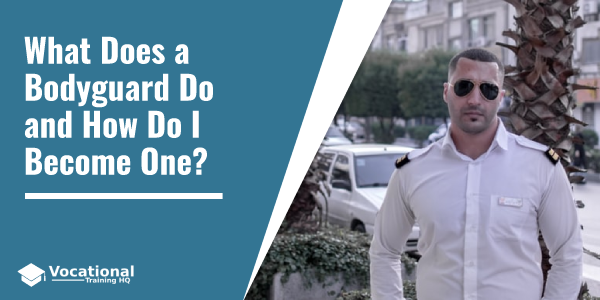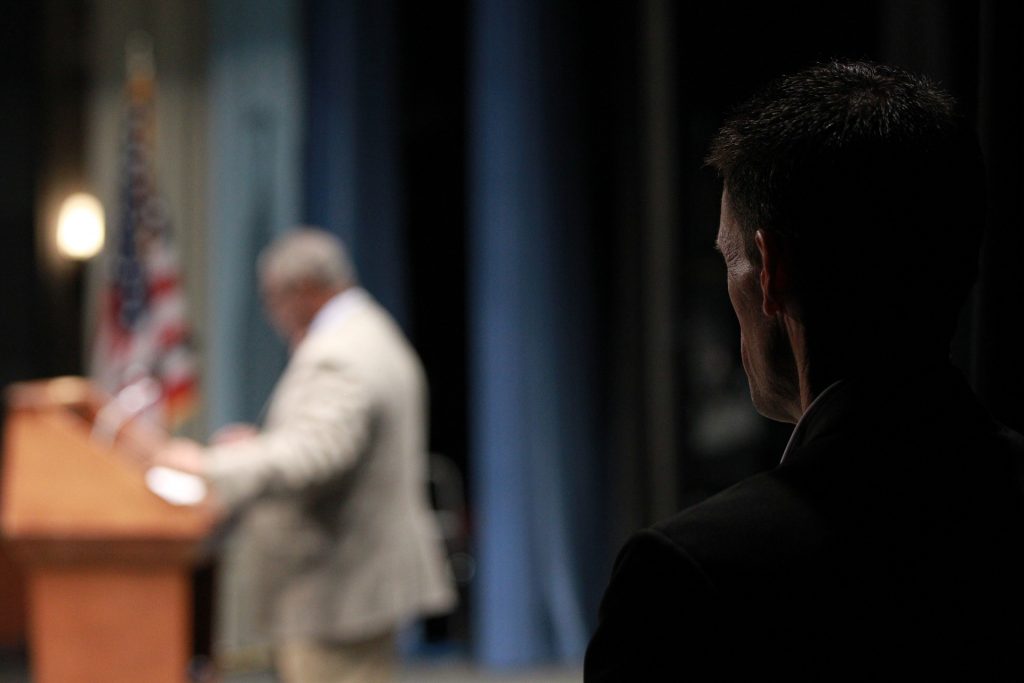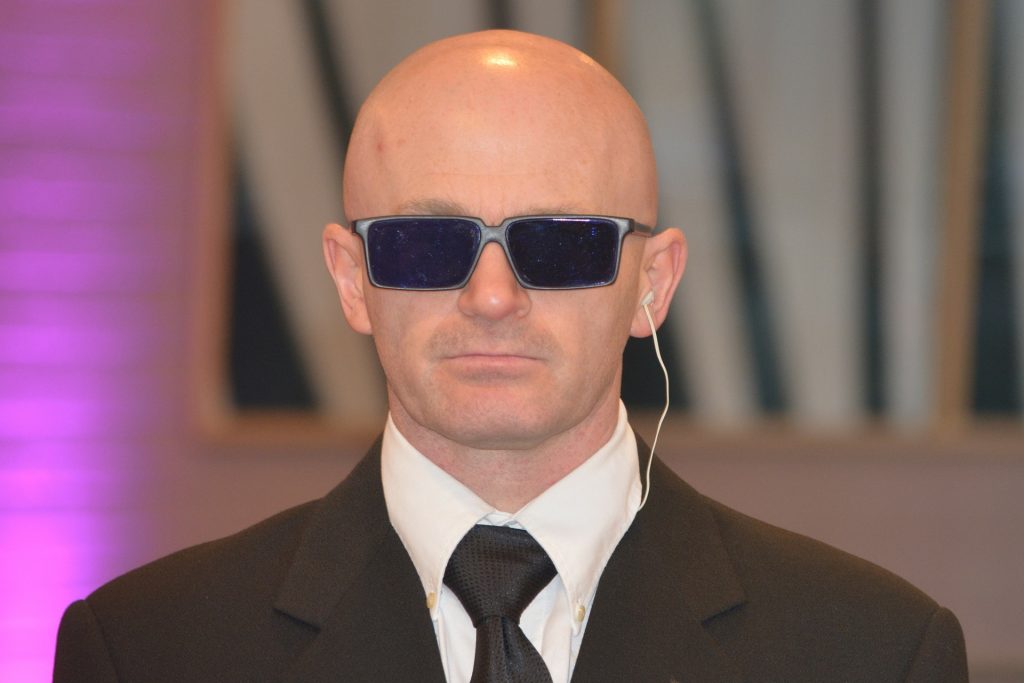A career as a bodyguard for VIPs can sound like a dream job because it gives you the opportunity of traveling, meeting high-profile people, and, of course, it also pays well.
But finding employment in this sector can be quite hard and requires special training and great skills.
A fast tip if you want to become a bodyguard is to first find employment as an armed security guard in a different field.
Having experience in different security fields can look really good on your resume if you apply for a close protection job.
But of course, you also need special training and skills to be able to do this job.
Executive protection training (also known as bodyguard training) will help you obtain the skills needed for the job.
Of course, you also need physical strength and resistance but you also need to learn other things before being ready to provide executive protection services to high-profile individuals.
Legal requirements vary depending on the state where you reside but, in most cases, you will need training, insurance, licensing, and a permit to carry a firearm.
Article Table of Contents
A Bodyguard’s Job Description
A bodyguard’s main responsibility is to keep their client safe.
In order to do this, they monitor security systems, assess threats, plan daily activities, and special events.
Bodyguards may also do background checks on the people who come in contact with their clients or check vehicles for devices, bombs, or other threats.
This job can be quite stressful, especially when you need to prepare for a special event or in case there is a direct threat to your client.
To be able to perform well at this job and to keep yourself and your client safe you need great observation skills, the ability to keep calm in a stressful situation and to react quickly when needed.
Depending on the security company that hires you, you may have to take stress tests from time to time and attend special training sessions.
Bodyguards can be hired to protect top executives at big companies, high-ranking government officials, celebrities, and state witnesses.
Protecting a VIP
The first thing a bodyguard does is reviewing the activities the client has to do for the day and discuss how to best perform escorting, transportation, and monitoring tasks.
The responsibilities a bodyguard has to fulfill depend on their client and level of risk, and the role that he/she is assigned.
In some cases, bodyguards work as part of a team and some of them also drive vehicles.
Some are armed while others don’t wear a firearm.
The bodyguard is usually the first one who exists the car when the client arrives at the destination to ensure that the place is secure.
Bodyguard Training
Some of the things that you need to learn if you want to become a bodyguard are:
- unarmed combat
- firearms tactics
- crowd screening
- tactical driving
- search for explosive of bugs
- first aid
Of course, depending on the position you are targeting, you may also need other skills.
Courses are available at many private institutions, but it’s best to choose a school that is nationally known and respected, but it’s also important to choose your teacher very carefully and make sure that he/she is experienced and well trained in this field.
Executive Protection Courses, as they are called, focus on protective methodology and practices, many of the schools that provide being former military schools.
Course duration varies between 2 and 200 hours depending on how many topics they cover.
Many programs also include a practical hands-on section and will also offer you mentoring and coaching services.
The hands-on section teaches students when and how to use the tactics, procedures, techniques, and methodologies learned through a class.
Costs vary depending on the program’s complexity.
While individual classes cost somewhere in the $1000-$2000 range, complete courses can cost up to $10,000.
You may also have to pay a gun rental fee that ranges between $100-$300.
Classes Covered by Executive Protection Training
Although the structure varies depending on the program and the school you choose, executive protection training typically focuses on a few main areas:
Organizational training
This class focuses on teaching students about the hierarchy in an organization and how to understand their role within that organization, when and how to enforce security.
This part also includes classes about tactical planning and problem solving- courses designed to teach students how to build security programs and how to implement security measures.
You will also learn how to mix your security measures with the security measures that already exist within that organization.
High Profile Protection
This area includes subjects that teach you how to protect high-profile clients.
As mentioned above, your clients may be politicians, actors, singers, athletes and the type of protection they need varies depending on their role within the society and their lifestyle.
You will also learn how to organize convoy transport and how to control the public while ensuring that the public doesn’t have access to your client.
Setting up a command center and how to communicate with the team are other important aspects that will be covered by your training program.
Estate Security
This course teaches students how to protect the property of their clients and how to make sure that their clients are safe within their homes.
You will learn about patrolling, systems for detection, how to collaborate with law enforcement agencies, how to detect intrusions, how to do an inventory check of the property to see if any valuables are missing, and many more topics.
Bomb Search and Identification
As the name says, this class teaches you about different types of explosives and how to search an area for bombs.
In this course, you will also learn how to safely evacuate people.
CPR
This class is included in all training programs and it teaches you how to save lives.
VIP Security
This course is designed especially for those who want to work for celebrities.
Among other things, you will learn more about the celebrity lifestyle and how to deal with the press.
Defense Shooting
One of the most important classes that a bodyguard has to take is Defensive Shooting.
This class will teach you how to shoot properly, how to handle different types of firearms.
Your reaction in stressful situations will also be tested.
What Skills Do Employers Require?
If you want to become a bodyguard for VIPs you will most probably need to get a job with a high-end company that provides these types of services.
The company will train you on how to perfect your predictive and protective skills and how to detect real threats.
However, before finding employment with a high-end company you need to complete some training in the field, gain some experience, and you also need special skills that tell your employer that you are a right fit for the job:
- Observation skills- Security officers must always be aware of their surroundings and they need to quickly recognize possible threats.
- Communication skills- Bodyguards also have to interact with other people, sometimes in stressful situations and you need good communication skills in order to do this.
- Interpersonal skills- Security guards need to be tactful and know how to prevent confrontational situations from escalating.
- Problem-solving skills- As a bodyguard, you need to know how to determine the best course of action in a stressful or dangerous situation.
How Long Long Does It Take to Become a Bodyguard?
The answer to the above question depends on the program that you choose.
Some can be completed in 4 weeks while others can take up to nine months or a year.
There are also programs that offer you residency in school and these programs typically also cover practical exercises.
If your schedule doesn’t allow you to attend in-classroom courses, you can choose to take the classes online.
These include around 450 hours of formal training but after completing this section you may also have to complete the residency training where you will focus on the practical skills needed for this profession.
If you choose to complete an online program, you can learn at your own pace but this also means that it may take longer for you to complete your training.
In conclusion, becoming a bodyguard requires many hours of training because this profession implies a lot of responsibility.
But if you want to help protect people, you are in stellar physical shape, and you have good problem-solving abilities, this career can be very rewarding.



